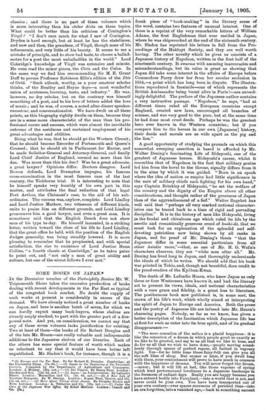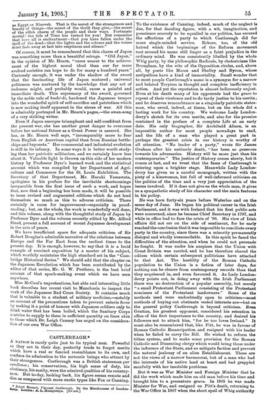IH the December number of the Fortnightly Review Mr. W.
Teignmouth Shore takes the excessive production of books dealing with recent developments in the Far East as typical of the congested book market. No doubt the supply of such works at present is considerably in excess of the demand. We have already noticed a great number of books on Japan, and here is another batch of seven, for which we can hardly expect many book-buyers, whose shelves are already amply stocked, to part with the greater part of a five- pound note. And yet, on consideration, we cannot say that any of these seven volumes lacks justification for existing. Two at least of them—the books of Sir Robert Douglas and of the late Mr. Hearn—are really valuable and indispensable additions to the Japanese shelves of our libraries. Each of the others has some special feature of worth which makes us reluctant to say that it would have been better left unpublished. Mr. Sladen's book, for instance, though it is a • (11) Europe and the Far Bast. By Sir Robert K. Douglas. Cambridge : at the University Press. (7s. 611.1—(2) Japan in the Beginning of the Twentieth Century. Compiled by the Department of Agriculture and Commerce. London : J. Murra.ii.[425s. net.J—(3) Bat Nippon. By Henry Dyer. London : Blackie and Son. 12s. 6d. net. ] —(4) Japan : an interpretation. By Lafcadio Hearn. London : millan and Co. [8e. 6d. net.]—(5) A Mew Life of Toyotomi Hideyoshi. By W. Dening. London : Kagan Paul, Trench, and. Co. [7s. 61. net.]—(6) More Queer Things about Japan. By Douglas Madan and 'Nora Lorimer. London : A. Treherne and Co. [Es. net.]—(7) Under the Care of the Japanese War Office. By Ethel MaCaul, London: Cassell and Co. Os..)
Adams, the first Englishman that ever resided in Japan, where he was shipwrecked at the end of the sixteenth century. Mr. Sladen has reprinted his letters in full from the Pro- ceedings of the Hakluyt Society, and they are well worth having. The other novelty which he gives us consists of a Japanese history of Napoleon, written in the first half of the nineteenth century. It swarms with amusing inaccuracies and misunderstandings, but its value is great as showing that Japan did take some interest in the affairs of Europe before Commodore Parry drew her from her secular seclusion in 1854,—a point which has long been in dispute. The illustra- tions reproduced in facsimile—one of which represents the British Ambassador being burnt alive in Paris !—are exceed- ingly delightful. The preface of the Japanese author contains a very instructive passage. "Napoleon," he says, "had at different times ruled all the European countries except England, created new laws, encouraged all branches of science, and was very good to the poor, but at the same time he had done most cruel deeds. Perhaps he was the greatest hero ever known in the Western countries ; but if you compare him to the heroes in our own [Japanese] history, their deeds and morals are as wide apart as the pig and the lion."
A good opportunity of studying the grounds on which this somewhat sweeping assertion is based is afforded by Mr. Walter Dening's fascinating Life of Hideyoshi, one of the greatest of Japanese heroes. Hideyoshi's career, whilst it resembles that of Napoleon in the fact that military genius led him from the hovel to the throne, signally differs from it in the aims by which it was guided. " Born in an epoch where the idea of nation or empire had little significance in the ears of military chiefs each fighting for his own hand," says Captain Brinkley of Hideyoshi, "he set the welfare of the country and the dignity of the Empire above all other considerations, and thought rather of the greatness of Japan than of the aggrandisement of a fief." Walter Bagehot has well said that " perhaps all very marked national character- istics can be traced back to a time of rigid and pervading discipline." It is in the history of men like Hideyoshi, living in the feudal and chivalrous age which ruled its life by the ascetic and romantically generous creed of bushi-db, that we =at look for an explanation of the splendid and self- devoting patriotism now being shown by all ranks in Japan, and for proof of Mr. Dening's thesis " that the Japanese differ in some essential particulars from all other Asiatic races,"—that, as one of Mr. H. G. Wells's characters observes, they are "white men after all." Mr.
Dening has lived long in Japan, and thoroughly understands the ideals of which he writes. We should add that his book was printed in Tokio, and, though not beautiful, does credit to the proof-readers of the Kyobun-Swan.
The death of Mr. Lafcadio Hearn, who knew Japan as only three or four Westerners have known it, and had the literary art to present its views, ideals, and national characteristics with a rare grace and fidelity, is a great loss to literature. The posthumous book now published is, in some sort, the crown of his life's work, which wholly aimed at interpreting the spirit of Japan to Europe and America. Both the prose and the poetry of Japanese life are infused into Mr. Hearn's
charming pages. Nobody, so far as we know, has given a better description of the fascination which Japanese life has at first for such as enter into its true spirit, and of its gradual disappearance :— "The mere sensation of the milieu is a placid happiness: it is like the sensation of a dream in which people greet us exactly as we like to be greeted, and say to us all that we like to hear, and do for us all that we wish to have done,—people moving sound- lessly through spaces of perfect repose, all bathed in vapoury light. Yea—for no little time these fairy-folk can give you all the soft bliss of sleep. But sooner or later, if you dwell long with them, your contentment will prove to have much in common with the happiness of dreams. You will never forget the dream, —never; but it will lift at last, like those vapours of spring which lend preternatural loveliness to a Japanese landscape in the forenoon of radiant days. Really you are happy becauseyou have entered bodily into Fairyland, into a world that is not, and never could be your own. You have been transported out of your own century—over spaces enormous of perished time—into an era forgotten, into a vanished age,—back to something ancient
as Egypt or Nineveh. That is the secret of the strangeness and beauty of things—the secret of the thrill they give,—the secret of the elfish charm of the people and their ways. Fortunate mortal! the tide of Time has turned for you! But remember that here all is enchantment—that you have fallen under the spell of the dead—that the lights and the colours and the voices must fade away at last into emptiness and silence."
Of course, it must be remembered that this charm of Japan was something more than a beautiful mirage. "Old Japan," in the opinion of Mr. Hearn, "came nearer to the achieve- ment of the highest moral ideal than our far more evolved societies can hope to do for many a hundred years."
Curiously enough, it was under the shadow of the sword that the fascinating life of Japan matured ; universal politeness was nurtured by the knowledge that any act of rudeness might, and probably would, cause a painful and immediate death. This supremacy of the sword, governed by the noble rule of bushi-do, hardened the Japanese temper into the wonderful spirit of self-sacrifice and patriotism which is now making itself apparent in the stress of war. All this is admirably portrayed in Mr. Hearn 's pages,—the swan-song of a very striking writer.
Even if Japan emerges triumphant and self-confident from the present war, she has another great danger to overcome before her national future as a Great Power is assured. She has, as Mr. Hearn well says, " incomparably more to fear from English or American capital than from Russian battle- ships and bayonets." Her commercial and industrial evolution is still in its infancy. In some ways it is better worth study- ing than her patriotic militarism, and we certainly know less about it. Valuable light is thrown on this side of her modern history by Professor Dyer's learned work and the statistical account which was compiled by her Department of Agri- culture and Commerce for the St. Louis Exhibition. The Secretary of that Department, Mr. Haruki Yamawata, apologises in his preface for the inevitable shortcomings inseparable from the first issue of such a work, and hopes that, now that a beginning has been made, it will be possible to issue revised and augmented editions which do not lend themselves so much as this to adverse criticism. There certainly is room for improvement—especially in proof- reading ; but, on the whole, the work is wonderfully well done, and this volume, along with the thoughtful study of Japan by Professor Dyer and the volume recently edited by Mr. Alfred Stead, present a full account of recent Japanese development in the arts of peace.
We have insufficient space for adequate criticism of Sir Robert Douglas's admirable narrative of the relations between Europe and the Par East from the earliest times to the present day. It is enough, however, to say that it is a lucid example of succinct exposition by a master of his subject, which worthily maintains the high standard set in the " Cam- bridge Historical Series." We should add that the chapter on the Japanese Revolution which has been contributed by the editor of that series, Mr. G. W. Prothero, is the best brief account of that epoch-making event which we have seen anywhere.
Miss McCaul's unpretentious, but able and interesting little book describes her recent visit to Manchuria to inspect the work of the Japanese Red Cross Society. It contains much that is valuable to a student of military medicine,—notably an account of the precautions taken to prevent enteric fever by making it a point of honour with Japanese soldiers only to drink water that has been boiled, which the Sanitary Corps contrive to supply to them in sufficient quantity on lines akin to those which Dr. Leigh Canney has urged on the considera- tion of our own War Office.
CASTLEREAGH.*







































 Previous page
Previous page